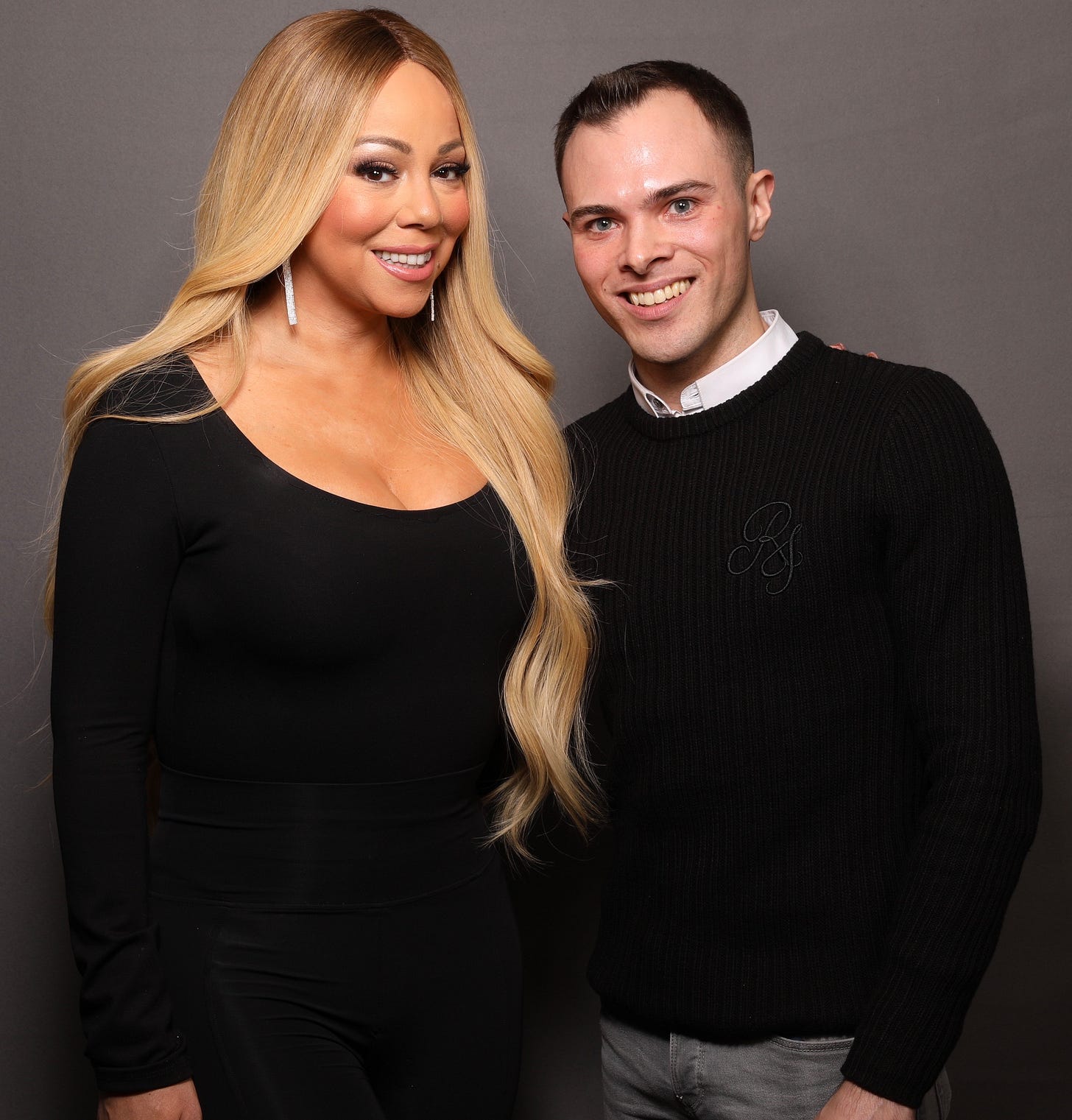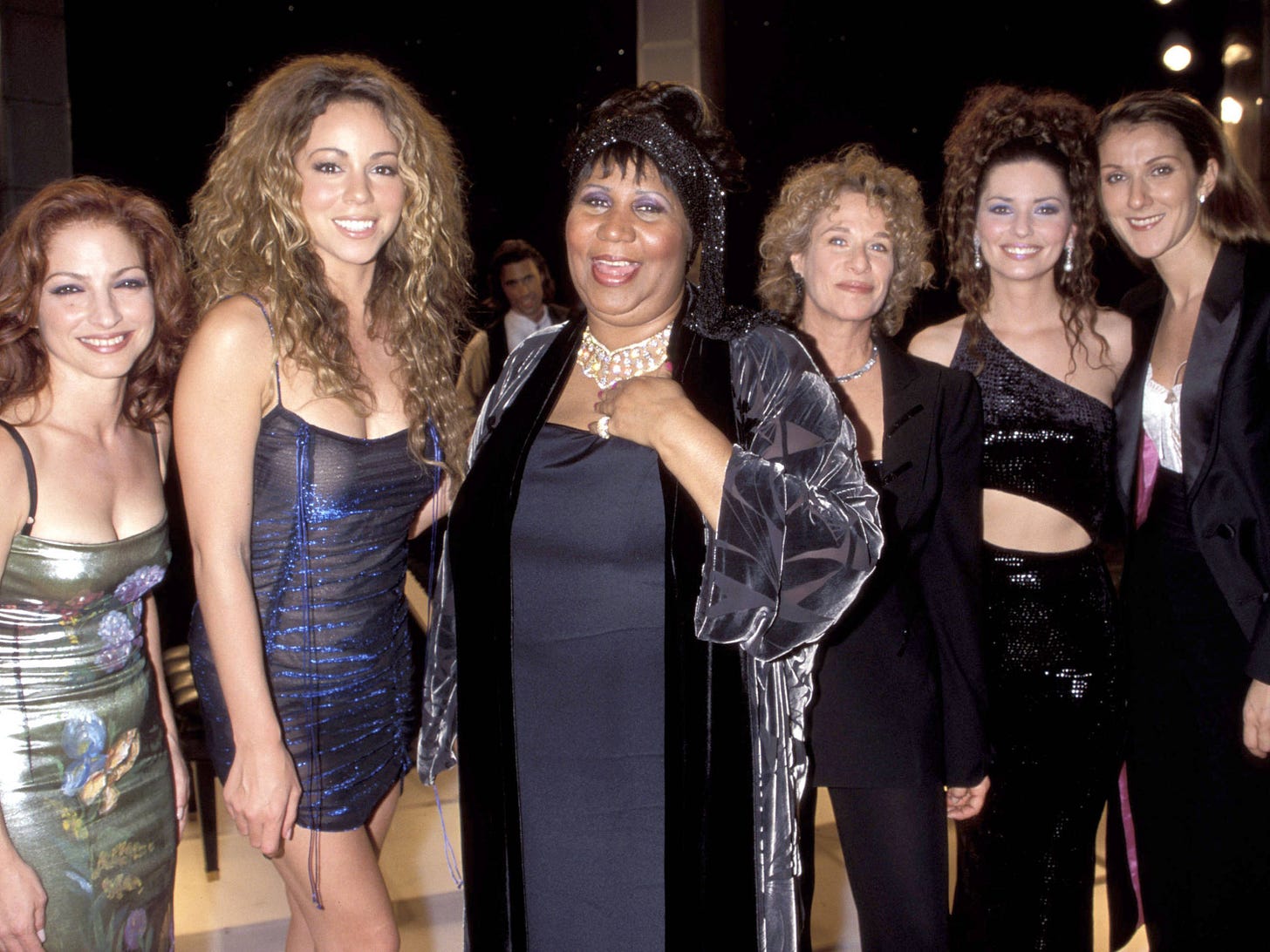Rarified Heir: Mariah Carey & Her Inspiration, Minnie Riperton, Share the Whistle Tone
We compare and contrast two magnificent singers across decades, plus discover the rare and little-known singing talent that you can learn yourself!
In a recent and endlessly fascinating chat with
of Substack’s The Vinyl Room, we spanned a couple of decades of recording artists who utilized and perfected the elusive-to-most whistle register or whistle tone, as it’s called.While Andy joyfully hovers around half my age, his favorite artist was heavily influenced by a singer whom I first heard in 1968 when I was 13! Here’s what I heard: Minnie Riperton joining her Rotary Connection bandmates in their debut album, the pop/soul clarion call that heralded a new sound and a new voice into the rock, R&B, and pop firmament.

Hers is the first voice you hear, and it’s not by accident: “Amen,” written and produced by Charles Stepney and Marshall Chess (sometimes credited to his “Marshall Paul” alias):
On Rotary Connection’s 4th album in 1969 (Songs), Minnie is used as she always had been, to this point, on the band’s albums…as both a singer and, using her whistle register, a kind of ethereal, ungodly musical instrument, sounding, at times, like a theremin or a kind of mystical keyboard threatening to run out of keys to the right!
Here, on Cream’s 1967 hit, “Tales of Brave Ulysses” (written by Eric Clapton and Martin Sharp), she shares lead vocal chores with John Jeremiah, while also taking frequent flight into her whistle register!
But, Wait: Before Minnie, There Was Andrea Davis

Riperton’s first professional singing engagement was in her hometown Chicago with girl group, The Gems, when she was 15, around 1962.

The Gems morphed into Chicago session singers, known as Studio Three. While a part of Studio Three, Minnie met her mentor, producer Billy Davis, who wrote her first local hit, “Lonely Girl” (arranged by Charles Stepney), released on Chicago’s Chess Records in 1966. To honor Davis for his loyalty and mentorship, she used the nom-de-tune of Andrea Davis.
Rotary Connection was in existence from 1966-1974 over 6 albums, with some overlap on either end to account for Minnie Riperton solo efforts. Curiously, and in one of those sudden, this-never-happens kind of fairytale way, an Epic Records college intern found Minnie in semi-retirement as a mother of 2 (including future SNL musical/comic standout, Maya Rudolph), and homemaker in Gainesville, FL in 1973.
In another part of town, a 23-year-old Tom Petty was just forming his Heartbreakers precursor, The Epics (coincidentally enough), which quickly morphed into Mudcrutch, and featured longtime bandmates Benmont Tench and Mike Campbell.
After the Epic intern heard Minnie’s demo of the song, “Seeing You This Way” (below, with studio chatter; listen for baby, Maya, barely 2, audible at the start) he took the tape to an A&R Veep at Epic. Riperton signed with Epic, and the family moved to L.A.
The song, fully-produced, made it onto Minnie’s Epic debut, Perfect Angel, released May 24, 1974. Later that summer, exclusive FR&B contributor, singer/songwriter/guitarist, Stephen Michael Schwartz, released his self-titled debut album on RCA Records. His one-of-a-kind experiences in the ‘70s-era Hollywood record biz span 20 riveting articles (in his own words), and can be accessed by clicking on this sentence!
“Seeing You This Way” (written by Minnie and her husband, Richard Rudolph) ended up being the third single released from Perfect Angel. Here she is, below, in the spring of 1975 on The Mike Douglas Show, which includes a post-performance interview.
She’s synching to track, so you not only see her perform, but you also get to hear the final studio recording, which features Stevie Wonder on piano, who also co-produced the album with Rudolph.
As he was leery having his home label, Motown, discover he had “wandered off the label reservation,” Stevie cleverly credited his playing on the record as being by one “El Toro Negro” (The Black Bull…he’s a Taurus), and his production credit (together with Rudolph) represented by the new Scorbu Productions name! No word if Motown ever found out about this mysterious “new” player!
Sales of Perfect Angel started out slowly to the point where Epic was ready to move on to the next album. Rudolph, however, convinced the label to release a fourth single, the ultimately transcendent “Lovin’ You” (official video here), a song he had begun composing in 1971, when he and Minnie still lived in Chicago.
They moved to Florida in short order, where work on the song continued into 1972, even as daughter, Maya, was born. Minnie developed the final melody to use as a distraction for baby Maya (listen for Minnie saying Maya’s name during the fade-out in the above-linked official video), while Rudolph wrote the lyrics and the bridge.
As Rudolph related to Gary Eskow in 2008: “We found ourselves performing in Portland one night during a huge blizzard. We look around and see that people are putting their arms around each other and having a great time as we’re playing ‘Lovin’ You.’”
Plus, according to Eskow, Epic’s initial reticence in releasing “Lovin’ You” was rooted in their plan to market Riperton solely as an R&B singer. However, Rudolph and Riperton prevailed, rejecting the R&B label, and insisted to Epic suits that “[Riperton is] a singer, period.”
“Lovin’ You”’s immediate success catapulted album sales, and in April 1975, the song went to the top of the charts in the U.S. and 24 other countries! “Lovin’ You” reached #2 on the UK Singles Chart, and #3 on the U.S. R&B chart. It sold more than a million copies and, thus, was awarded a gold record by the RIAA.
Two more albums for Epic followed Perfect Angel, with Minnie’s Stay in Love in 1976 being her final one for the label. In 1978, Richard Rudolph and Minnie’s attorney orchestrated a move to Capitol Records for Riperton and her CBS Records catalog. In April 1979, Riperton released her fifth and final album, Minnie. On Thursday, July 12, 1979, at 10 am, she succumbed to cancer, and died in the arms of her adoring husband.
More Minnie and Maya can be enjoyed in this recent Tune Tag:
🎵 🎵 🎵 🎵 🎵 🎵 🎵 🎵 🎵 🎵 🎵
🎤Fast-forward 22 Years to 1990…Andy of The Vinyl Room Chimes In on Mariah Carey

“Mariah’s range is very similar to, if not slightly wider than, Minnie’s. Mariah’s range is from G#2 to G#7, but as she would say, it varies a lot depending on how much sleep she got the night before!
“Indeed, Mariah acknowledges Minnie as an important inspiration for her. In a 2017 Fuse 20-minute TV interview with Touré, Mariah said, ‘Of course! Quite naturally, I’ve been obsessed with Minnie Riperton! I wouldn’t be who I was if there was no Minnie Riperton. I’m just so grateful and in awe of her!’”
A brief, 4-minute interview segment from the ‘90s where Mariah acknowledges her appreciation for Minnie, including a fascinating compare/contrast between the two:
“Mariah was always acknowledged as having the whistle register. There were rumours, when she first emerged in 1990, that she was a studio product (probably fueled by the Milli Vanilli scandal) which, of course, her live performances put to rest…
“Notably, her 1992 Grammy performance of ‘If It’s Over,’ a song she co-wrote with Carole King, is still, arguably, one of her best performances of all time…and, trust me, I’ve watched them all!”
Andy continues: “Legend has it that Carole reached out to Mariah, who, at the time, only had one album out, and asked her if she wanted to do something together, which Mariah first thought was a joke!”

Pssst! Let’s sneak a peek at that day’s rehearsal, backstage before the arrival of The Queen of Soul! “Hey, girrrrrl!”
“Carole was keen on hearing Mariah sing ‘Natural Woman’ (written by King, Gerry Goffin, and Jerry Wexler), but Mariah felt (and still thinks) Aretha is untouchable, and she didn’t want Aretha or her fans to feel it was some sort of provocation, so they wrote a song ‘in the style of’ ‘Natural Woman,’ which I think was a smart move.
“Mariah’s Unplugged MTV appearance (click here to watch) was a great commercial decision (courtesy of Sony/CBS Music Group CEO, and Mariah’s husband from 1993-’98, Tommy Mottola, who knew all these rumours about Mariah not being able to sing live wouldn’t cease unless and until she did something like this). If memory serves, it was among the first Unplugged shows to be broadcast by MTV, but the very first one to ever get released commercially (as a live EP).
“In addition, her MTV Unplugged show, also from 1992, was a watershed moment in her career as the press started taking her seriously as a live performer.
“What follows below is the Mariah song (1996’s “Underneath the Stars”) most critics say displays Minnie’s influence the most. Interestingly, there are no whistle tones in the lead, only in the background vocals (which she layered very carefully).
“I suspect this was because there was an edict from her label (Columbia/Sony, worldwide) to ‘tone the whistle down.’
“She was still with Columbia, but it was very clear she would leave the label imminently (she recorded this album with the sole purpose of finishing her contract and exiting the label, as the situation was unsustainable, with her divorce from Tommy Mottola having just been finalized).”
“In 1999, she recorded ‘Bliss’: Same vibe/style, but more edgy, and with whistles in the lead.” An acapella version to highlight the vocals:
Andy was kind enough to share some select Mariah songs where she’s using her whistle register: “All In Your Mind” (1990), “Emotions” (1991), “Yours” (2002), “Fly Like a Bird” (2005), “Migrate” (2008), and the first seconds of 1993’s “Dreamlover.”
“There’s tons more,” he hastens to add, “but, ‘Emotions’ and ‘Bliss’ are the two where the whistle tone is an active part of the melody in the bridge/chorus, as opposed to an ornament in the intro/outro or climax.”












This was so much fun!! I’ll start by saying that, when I see my name next to yours, I feel the same way Mariah felt when Carole asked her to collaborate in ‘91 or when Aretha invited her to perform live in that ‘98 Divas live show you mention. I’m like “really? this legend with ME?” 🤣 It’s an incredible honour for which I am, as MC herself would say, “eternally grateful”.
What a fantastic overview of both, chronologically and so well intertwined and narrated, packed with interesting (and fun!) stuff.
Thank you for letting me be a part of this.
And now, let’s go everybody: get those whistle notes ready, at the count of 3! 😁♥️
Great article, though far above my paygrade in terms of technical vocal analysis, so I haven't much to say on that subject.
A small correction -- MTV had been doing Unplugged since 1989, years before Mariah's appearance. And while Mariah's live Unplugged is indeed one of the best selling Unplugged live albums, it's not the first. Paul McCartney was the first artist to release a live Unplugged album --and his 1991 appearance is credited by the show's creator for having made both Unplugged and live Unplugged albums a Thing. 😎 Making things a Thing is what Macca does best, of course, and it's one of Paul's best live albums.
https://open.spotify.com/album/7KvVAe42ZV1LcfaW96mBNk?si=aj86NJ9URq6AwBHF3VWQZA